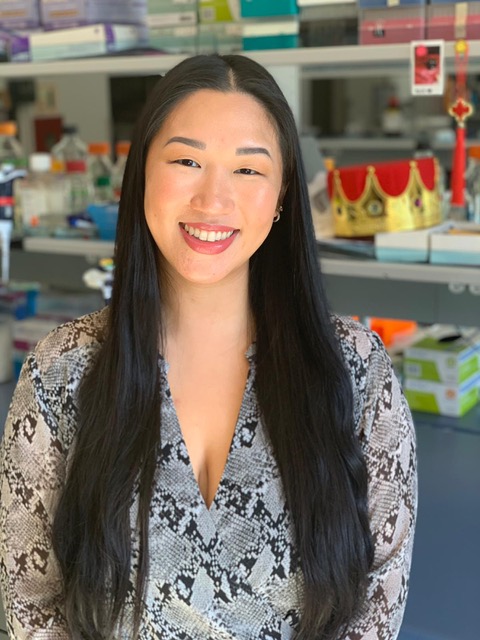
Dr. Lianna Wat completed her Ph.D. in 2021 in the Rideout Lab.
Dr. Wat’s work will have a long-lasting effect on the field of physiology and metabolism – her Ph.D. thesis showed the discovery of two distinct mechanisms that explain for the first time, in exquisite detail, how sex differences in fat metabolism arise. Her publications present a staggering amount of data on sex differences in lipid metabolism throughout the life span that will provide a critical resource for the research community. Her findings set the standard for researchers wishing to include both sexes in their research.
During her Ph.D., she published two high-impact first-author papers in PLoS Biology and eLife #1, and was a co-author on additional papers from the Rideout lab; eLife #2, G3: Genes, Genomes, Genetics. This research excellence was recognized nationally at the Canadian Student Health Research Forum in 2020, where she won three awards including the top prize; Lindau Award, Gairdner Student Award, CIHR Gold Award of Excellence. Dr. Wat was recently awarded a 2021 Elizabeth Young New Investigator Award from the Organization for the Study of Sex Differences and was invited to present at an international seminar series hosted by the American Society for Biochemistry and Molecular Biology. Given that Dr. Wat is on the shortlist for the best 2021 thesis, run by the Genetics Society of America with a focus on Drosophila research, these accomplishments together show widespread recognition of her outstanding drive, passion, and brilliance.
Importantly, these exceptional research achievements have occurred against a backdrop of excellence in teaching in the CAPS 390 course, and an active role as the director/president for a graduate student society (CPhyGS) and the LSI trainee society (SoLIT). In recognition of outstanding teaching and service contributions, Dr. Wat was awarded a Laura Jasch Award in 2021.
Tell us about your experience in UBC and the Rideout Lab
The five years I spent at UBC in the Rideout lab will be unforgettable. When I started my Ph.D., I was just a fledgling and had so many things to learn. What I really benefited from was having amazing role models and mentors in my environment – people that I could look up to, emulate, and learn from. There were two main things I learned during my time here in addition to designing and executing well-thought-out experiments. The first was learning how to balance my research goals with my passions outside of the lab, such as teaching and community involvement. It took close to a year to learn how to manage my time, passions, and research to be consistently productive while maintaining my mental wellness. The second thing I learned was to embrace being a woman in science and that I should not need to give up my femininity and personal interests to be considered professional or successful.
Overall, my time as a PhD student has been an invaluable learning experience, and I’m so grateful to all my mentors that have helped shaped me into the independent scientist I am today.
What were your significant research accomplishments during your PhD?
The main discoveries from my PhD research were identifying new functions for metabolic genes and pathways that contribute to how males and females store and breakdown fat differently. However, I would say my most significant contribution to the field was demonstrating the importance of including both males and females in my experiments. Only by investigating my research questions in both sexes was I able to discover sex-limited effects of metabolic effectors. Overall, my work sets the foundation for future studies aimed at identifying conserved mechanisms underlying sex-specific regulation of fat metabolism and thus allow for a more comprehensive understanding of fat metabolism and metabolic diseases associated with dysregulated fat metabolism.
What are your long-term goals in your research career?
I have always loved learning new things and understanding new ideas. So, once I got my first taste of research, I quickly developed a passion for making discoveries and contributing to our body of knowledge.
I want to continue this for the rest of my career so my long-term goal is to run an independent research lab where I can continue to pursue what I’m passionate about.
Dr. Wat is pursuing her postdoctoral work in the Svensson Lab at Stanford University. The Department of Cellular & Physiological Sciences looks forward to watching her research flourish in this new chapter of her career.
She will present a seminar via Zoom for the CPS Clee memorial Seminar Series on Thursday, February 24th at 1:00 pm, “Sex-specific regulation of fat metabolism in Drosophila”.